‘Beautifying with music’: an interview with composer James Whitbourn
Stephen Pritchard
Tuesday, March 19, 2024
Composer and conductor James Whitbourn died in March 2024 after a cancer diagnosis. In 2022 he talked to Stephen Pritchard about writing for choirs and how his experience of directing music for the BBC’s Daily Service helped him to find his niche as a composer
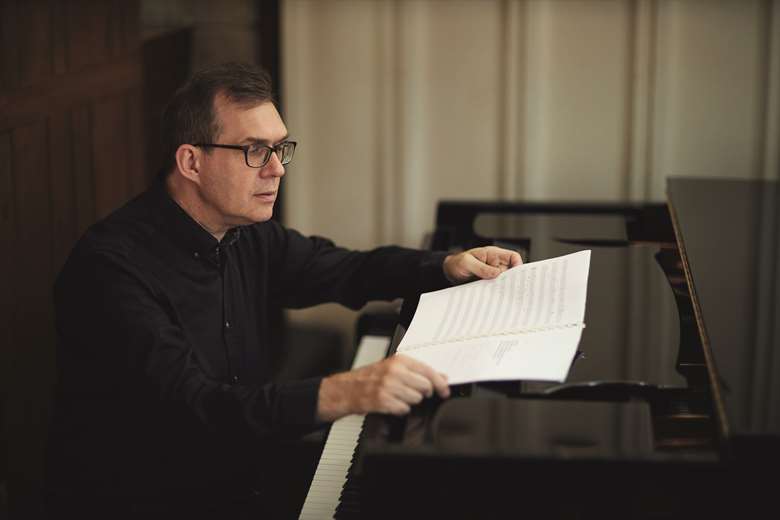
Photo Credit: David Fisher
Before settling down to write a piece, composer-conductor James Whitbourn makes careful preparations. ‘I like to know the choir I am writing for, and to have its sound in my mind. I think of the way the singers breathe; their facial expressions. I like to know for what occasion the piece is commissioned, and try to picture its first performance and what it might feel like to be there.’
Then, with his musical imagination suitably inspired, he creates a dedicated notebook, with the text of the commission on the right-hand page and five staves on the left. ‘I build up a series of ideas, and often have several versions of the same piece in one notebook. But then comes the difficult moment when you have to choose what to keep and what to discard…’
Over the years Whitbourn has made dozens of these notebooks, which today form a useful archive of his output, ranging from many small motets for chamber choirs to Grammy-nominated works for full orchestra, soloists and chorus, all composed over an international career that has also encompassed conducting, broadcasting, and video production in opera and ballet.
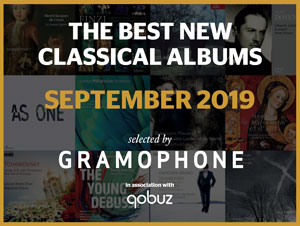
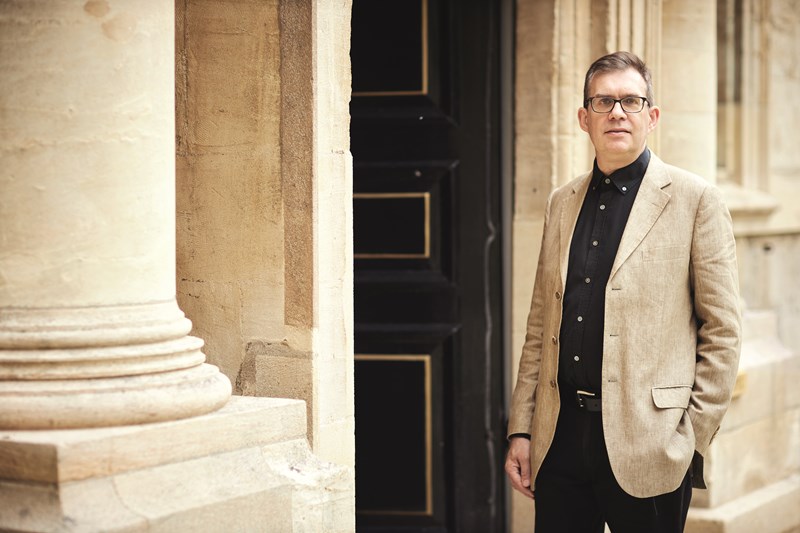
Composer James Whitbourn
Whitbourn’s works are widely admired for their sophisticated ability to connect directly with performers and audiences alike, and to set off chain reactions of new commissions. Take, for example, Annelies, his moving, large-scale setting of the diary of Anne Frank. Whitbourn’s freshness and accessibility has established it as one of the most sung large-scale choral works of the 21st century, with more than 40 performances taking place somewhere in the world every year. The heartbreaking diary kept by the Amsterdam teenager as she hid from the Nazis was adapted by the poet Melanie Challenger, who approached Whitbourn to collaborate on the piece after she heard a performance of his ‘Son of God’ Mass, which itself had spun out of the score he wrote for the BBC/Discovery Channel series Son of God – the first music that really got him noticed.
That Mass also opened new doors for him in America. The Choir of Clare College, Cambridge recorded it under Timothy Brown, who showed the piece to James Jordan at Westminster Choir College, Princeton. He performed it with Westminster Williamson Voices, which led to yet another chain reaction – a commission for Luminosity, a seven-movement celebration of the power of creative love, in which Whitbourn fuses powerful vocal writing with seductive eastern influences. Ever since, he has enjoyed a rich connection with a number of US ensembles, including Houston Chamber Choir and Cor Cantiamo of Illinois, who recently recorded his musical portrait of C.S. Lewis, The Seven Heavens.
For Whitbourn, working with these US choirs is a particularly rewarding experience. For example, he finds James Jordan’s Williamson Voices a notably responsive ensemble: ‘Their warmth of sound is coupled with a warmth of spirit; there’s a generosity in their singing which is very engaging and plays a big part in my musical imagination. Writing for them is a joy.’
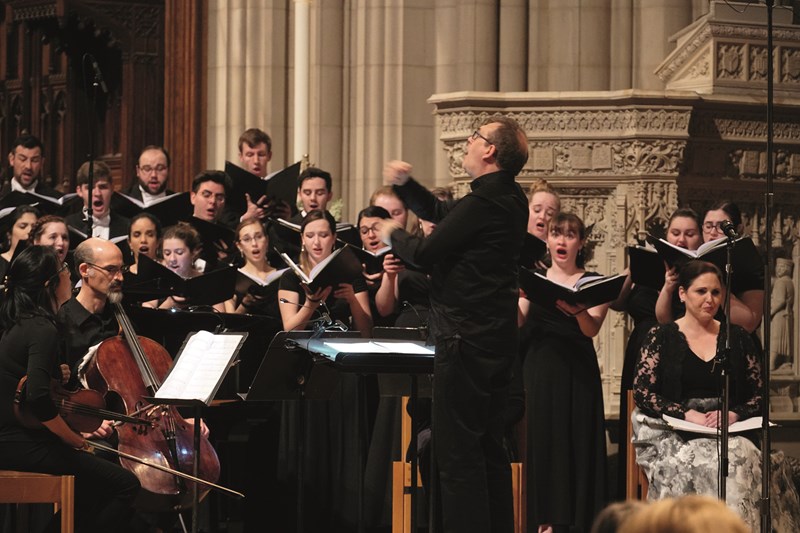
James Whitbourn as guest conductor of the Williamson Voices of Westminster Choir College performing Annelies in Washington National Cathedral in April 2019
Now, at the age of 57, Whitbourn’s busy life has come full circle with his appointment earlier this year as director of music at St Edmund Hall, Oxford, marking a return to the musical roots he established when an undergraduate choral scholar just next door at Magdalen College and before that as a young singer and organist in Kent. He took up his new post just as the Covid-19 lockdown made his brief to ‘beautify the Hall with music’ a tricky one to achieve. Music is not taught at undergraduate level at the college, but students are encouraged to sing and play, with choral exhibitions and scholarships offered in the chapel choir. Teddy Hall, as it is affectionately known, is the home of the Centre for the Creative Brain, and music is seen as vital in stimulating academic thought and achievement. ‘Despite the lockdown, we managed to stream individual instrumentalists staging concerts from their homes and Evensong every Sunday in term, with members of the choir singing solos in isolation.’
When the choir is able to reunite, he aims to gradually widen its repertoire, to include, for example, ‘a local piece’, Arvo Pärt’s Littlemore Tractus. This sets much-quoted words from a sermon John Henry Newman preached in 1843 in Littlemore, Oxford, where Whitbourn lives with his family: ‘May He support us all the day long, till the shades lengthen, and the evening comes, and the busy world is hushed …’ And more words from Newman feature in a new work from Whitbourn’s busy pen. Commissioned by Oriel College, Oxford, where Newman was a fellow, Solitude – which reminds us of the importance of silent time alone with God – is Whitbourn’s first to be published in his newly-established relationship with Oxford University Press.
OUP has also published Apollo, his first solo work for organ, a thrillingly exciting piece that traces the first spaceflight to the Moon – and provides a perfect illustration of his fertile musical imagination. Whitbourn has melded this thoroughly modern achievement to a truly ancient one, as he takes as its theme the first notated piece whose composer is known: a hymn to Apollo composed by Athénaios in around 128BC. That ancient melody underpins a narrative sequence which begins in the rocket’s command module, with a gentle throbbing heard from within. Then comes countdown, followed quickly by ignition – an explosion of energy as the rocket is thrust towards the skies.
‘The first naked-eye sight of the far side of the Moon uses the mysterious second verse of Athénaios’s hymn, with its unusual, harmonically-twisting melody,’ explains Whitbourn. ‘Then comes one of the most famous images of that mission – Earthrise: the first sighting of planet Earth rising above the horizon of the Moon. Earthrise leads to the moment, when, just before lunar sunrise, the astronauts, in their 1968 Christmas Eve broadcast, read passages from Genesis.’ Appropriately, Apollo was commissioned by James Roman, an organist working in Houston, Texas, close to the NASA base where the Apollo missions were controlled.

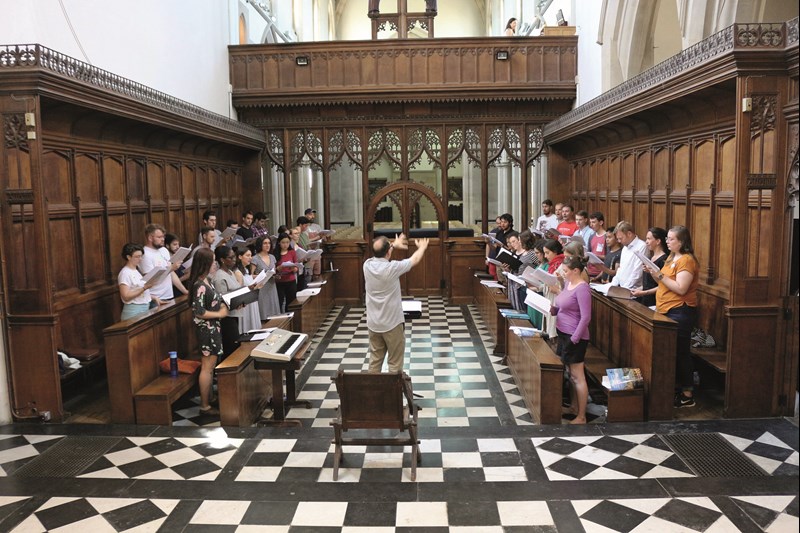
James Whitbourn leads students on the Oxford University Choral Singing Summer School through the riches of English choral tradition, and in particular music associated with Oxford
Whitbourn began composing when still at grammar school in Tunbridge Wells, Kent. ‘I had two exceptional music teachers at the Skinners’ School – Christopher Harris and Jared Armstrong – who seemed to enjoy having a pupil they could push beyond A-level. I also sang in the choir at St James’s Church, under the direction of Derek Baldwin; and I learned to conduct in that choir, too. These were formative experiences for me.’ More composition followed at university and then in his first job, as director of music for the BBC’s Daily Service. ‘That required finding a relevant piece lasting two minutes, suitable for a broad audience. I quickly found that few existed, so set about writing my own. I felt like a 20th-century kapellmeister! This was in the 1980s, before email, and I would return to the office to hear secretaries taking phone calls from listeners, commenting on the music and sometimes asking where they could find copies. I quickly got a sense of what engaged people. Writing tonal music wasn’t particularly encouraged in some quarters in those days, but I discovered that I could say new things using existing language and people responded.’
That talent to say new things within a largely tonal structure led to a steady stream of commissions while at the same time his work at the BBC expanded into television. For the past 30 years Whitbourn has produced BBC2’s popular Carols from King’s and Easter from King’s programmes, working closely with former director of music at King’s College, Cambridge, Sir Stephen Cleobury and his successor, Daniel Hyde. ‘Stephen Cleobury was very encouraging to me, commissioning a set of Easter canticles for King’s, and performing three carols to texts by Robert Tear, who, in addition to being a great singer and friend, was also a wonderful poet.’ Whitbourn took his broadcasting experience into DVD and Blu-ray production, making hundreds of recordings of opera and ballet at the Royal Opera House, Glyndebourne, and in Madrid and Barcelona, working with some of the world’s great conductors, but all the time, as a member of the music faculty at Oxford University, composing for choirs and leading choral courses, most notably at St Stephen’s House, Oxford. His popular Oxford University Choral Singing Summer School has been complemented since 2013 by a choral conducting course, run with Westminster Choir College at Oxford, where Williamson Voices form the choir.
Today, to dispel the current gloom around Covid-19, Whitbourn is revisiting his first Christmas piece for OUP. ‘It’s a setting of a text by John 'The Blind' Audelay, found in a little 15th-century book in the Bodleian Library. I call it Christmas Welcome. It was commissioned by Christ Church Cathedral, Houston. Another church in Houston, St Luke’s, heard it and asked me if I would orchestrate it for them.’ It’s another example of the chain reactions that have punctuated this hugely creative life, and it seems certain it won’t be the last.
Stephen Pritchard writes on music for the Observer and the classical music website Bachtrack. He trained at Portsmouth Cathedral and sings with the English Chamber Choir.
This article originally appeared in the November/December 2020 issue of Choir & Organ magazine. Never miss an issue – subscribe today






